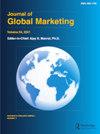Understanding the Predictors of Rural Customers’ Continuance Intention toward Mobile Banking Services Applications during the COVID-19 Pandemic
IF 4.3
Q1 Business, Management and Accounting
引用次数: 14
Abstract
Abstract The purpose of this study is to examine the antecedents of customers’ continuance intention to use mobile banking services applications (MBSAs) during the COVID-19 pandemic. Grounding on the Technology Acceptance Model, Theory of Planned Behavior, and Cognitive Load Theory, an integrated conceptual framework was proposed and tested incorporating psychological factors (i.e., cyberchondria, perceived anxiety) and situational factors (i.e., social distance, institutional support). Data were collected from 250 rural customers and analyzed with Structural Equation Modeling. The results showed that subjective norms, perceived ease of use, social distance, attitudes, cyberchondria, and institutional support influenced users’ continuance intention. Moreover, the results showed that perceived anxiety, subjective norms, perceived ease of use, and perceived usefulness influenced users’ attitudes. Besides, the findings suggested that attitudes mediate the influence of subjective norms, usefulness, ease of use, and social distance on users’ intention. This study is unique in terms of investigating pandemic-specific psychological and situational factors in explaining consumers’ continuance intention. Therefore, the service providers and professionals should be cautious in designing MBSAs so that consumers’ usage behaviors may not vary during an unprecedented situation (e.g., COVID-19). The theoretical and practical implications were discussed.新冠肺炎疫情期间农村客户对移动银行服务应用延续意愿的预测因素
摘要本研究的目的是检验新冠肺炎大流行期间客户继续使用移动银行服务应用程序(MBSA)的意愿的前因。基于技术接受模型、计划行为理论和认知负荷理论,提出并测试了一个综合概念框架,该框架包含心理因素(即网络疑病、感知焦虑)和情境因素(即社交距离、制度支持)。数据收集自250名农村客户,并采用结构方程建模进行分析。结果表明,主观规范、易用性、社交距离、态度、网络疑病和制度支持对用户的持续意愿有影响。此外,研究结果表明,感知焦虑、主观规范、感知易用性和感知有用性会影响用户的态度。此外,研究结果表明,态度在主观规范、有用性、易用性和社交距离对用户意图的影响中起中介作用。这项研究在调查特定于疫情的心理和情境因素以解释消费者的持续意向方面是独特的。因此,服务提供商和专业人士在设计MBSA时应谨慎,以便消费者的使用行为在前所未有的情况下(例如,新冠肺炎)不会发生变化。讨论了其理论意义和实践意义。
本文章由计算机程序翻译,如有差异,请以英文原文为准。
求助全文
约1分钟内获得全文
求助全文
来源期刊

Journal of Global Marketing
Business, Management and Accounting-Business and International Management
CiteScore
6.80
自引率
0.00%
发文量
10
期刊介绍:
Stay current on cross-cultural marketing at both micro and macro levels! The Journal of Global Marketing is the top-notch journal packed with the latest global marketing planning and programming strategies, current information, and contemporary research findings on marketing challenges and opportunities that firms, industries, and public sector agencies encounter worldwide. The expert contributors to the journal include leading marketing and international business scholars, practitioners, and policymakers who provide up-to-date practical information vital for management and administrative professionals.
 求助内容:
求助内容: 应助结果提醒方式:
应助结果提醒方式:


